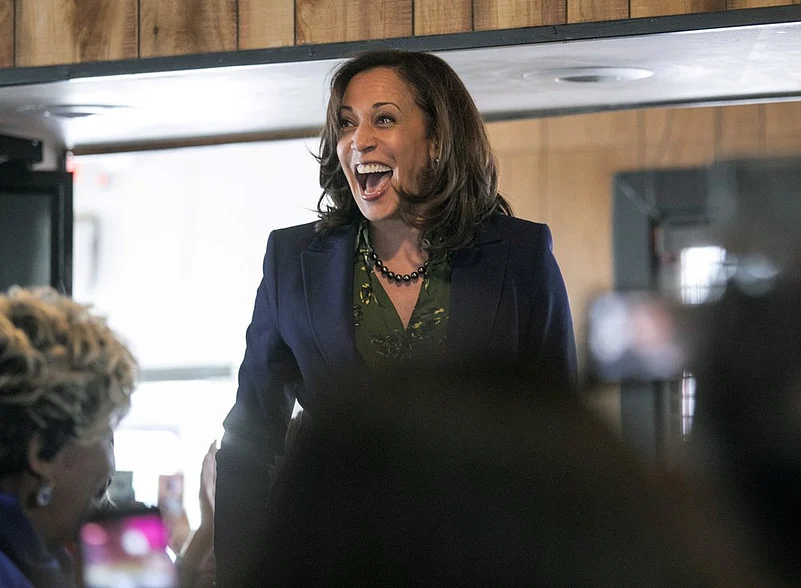Michigan Governor Gretchen Whitmer wanted out. She had caught the interest of Joe Biden and his vice presidential vetting committee, who were drawn to her prominence in a crucial battleground state and her aggressive response to the coronavirus outbreak there.
But by late spring, the nation was in the midst of a reckoning over race and inequality following the death of George Floyd, a Black man who died after a white police officer pressed his knee into his neck for several minutes.
Whitmer sent word to Biden's team that while she was flattered, she no longer wanted to be considered for the running mate slot, according to a high-ranking Democrat familiar with the process. She recommended Biden pick a Black woman.
Advertisement
But Biden still wanted Whitmer in the mix, and he personally called her in mid-June to ask if she would continue on to the second, more intensive round of vetting, according to the official. Whitmer agreed.
But forces in the country, and within the Democratic Party, were indeed pushing Biden toward a history-making pick.
As protests over the death of Floyd and other Black Americans filled the streets across the country, an array of Democrats urged Biden to put a Black woman on the ticket — a nod to this moment in the nation's history, to the critical role Black voters played in Biden's assent to the Democratic nomination, and to their vital importance in his general election campaign against President Donald Trump.
Advertisement
On Tuesday, Biden tapped California Senator Kamala Harris to be his running mate, making her the first Black woman to serve on a major party presidential ticket. This account of how he made that decision, the most important of his political career, is based on interviews with 10 people with direct knowledge of the vetting and selection process. Most insisted on anonymity to disclose private conversations and deliberations.
Biden, well aware of the potential pitfalls of being a 77-year-old white male standard-bearer of a party increasingly comprised of women, people of colour and young voters, made clear even before he had clinched the Democratic nomination that his running mate would be a woman.
His initial list of possible contenders was sprawling: roughly 20 governors, senators, congresswomen, mayors and other Democratic stalwarts. They were young and old; Black, Hispanic, white, Asian; straight and gay. Some, including Harris, had competed against Biden for the Democratic nomination.
From the start, some Biden advisers saw Harris as a logical choice. She was among the party's most popular figures, a deft debater and a fundraising juggernaut. She had been thoroughly vetted during her own campaign and Biden's team expected there would be few surprises if she was the pick.
Indeed, Harris' potential downsides were well-known to Biden advisers. Her record as a prosecutor in California was already viewed skeptically by some younger Democrats during the primary and would face even more scrutiny against the backdrop of a national debate over inequality in the criminal justice system.
Advertisement
There were also nagging questions about Harris' most high-profile moment of the primary campaign — a harsh and deeply personal broadside against Biden over his position on school busing in the 1970s.
Though Biden would later brush the moment aside as campaign tactics, the attack was said to have stunned the former vice president, who had considered his relationship with Harris strong. It also raised concern among a small cadre of Biden advisers that Harris would be eyeing the Oval Office herself from the start, a particular worry given that Biden has not firmly committed to serving two terms if elected in November.
Advertisement
And so, as spring turned to summer, a string of other Black women would take a turn in the spotlight as Biden weighed his options. Atlanta Mayor Keisha Lance Bottoms and Florida Rep. Val Demings impressed Biden's team with their leadership during the police brutality protests.
Some House Democrats — including South Carolina Rep. James Clyburn, a close Biden confidant — advocated for Rep. Karen Bass, a Californian who chairs the Congressional Black Caucus. Biden also took a strong interest in Susan Rice, with whom he worked closely when she served in the White House as President Barack Obama's national security adviser.
Advertisement
The leading contenders, who also included Massachusetts Sen. Elizabeth Warren and Illinois Sen. Tammy Duckworth, submitted reams of financial records, texts of speeches and other personal information. Biden's selection team canvassed a vast array of Democrats to ask for their views on the candidates' temperament and families, then grilled the candidates on much of the same.
Biden, too, regularly discussed his potential pick with his sprawling network of friends and advisers. He used Obama in particular as a sounding board, though confidants to both men say the former president was careful not to tip his hand in those conversations as to whom he preferred.
Advertisement
But in private, Obama suggested to others that he believed Harris was the favourite.
In one of Harris' conversations with the vetting committee, Chris Dodd — a longtime Biden friend who served alongside him in the Senate — asked if she had remorse for her debate stage attack on his busing record.



















